英语五种基本句型及练习附答案
- 格式:docx
- 大小:19.27 KB
- 文档页数:11



英语的基本句型主要有五种,它们是:1、主语——动词——表语2、主语——动词3、主语——动词——宾语4、主语——动词——宾语——宾语5、主语——动词——宾语——补语掌握好这些基本句型,就可以为灵活运用语言打下良好的基础。
下面分别讲解这五种句型。
一、主语——动词——表语在这一句型中,动词是系动词,划线部分为表语。
1.Mr.Brown is an engineer.<名词做表语>2.Gradualy he became silent.<形容词做表语>3.She remained standing for a hour.<现在分词做表语>4.The question remained unsolved.<过去分词做表语>5.The machine is out of order.<介词短语做表语>6.The television was on.<副词做表语>7.His plan is to keep the affair secret.<动词不定式做表语>8.My job is repairing cars.<动名词做表语>9.The question is what you want to do.<从句做表语,即:表语从句>注意:在下面的句子中,形容词做表语,在表语的后面常常接不定式结构。
I'm happy to meet you.They are willing to help.We are determined to follow his example.二、主语——动词在这一句型中,动词为不与物动词与不与物的动词词组。
在有的句子中,不与物动词可以有状语修饰。
1.The sun is rising.2.I'll try.3.Did you sleep well?<well做状语,修饰不与物动词sleep>4.The engine broke down.注意:在此句型中,有少数不与物动词表达被动含义,表达主语本身所具有的特性,不用被动语态。

英语五种基本句型:基本句型一: S V (主+谓)基本句型二: S L P (主+系+表)基本句型三: S V O (主+谓+宾)基本句型四: S V O O (主+谓+间宾+直宾)基本句型五: S V O C (主+谓+宾+宾补)句型一: S+V (主+谓)Eg:1. The sun │was shining. 2. The moon │rose.3. The universe │remains.4. We all │breathe, eat, and drink.5. Who │cares?6. What he said │does not matter.7. They │talked for half an hour. 8. The pen │writes smoothly句型二:S+L+P (主+系+表)[fall,look,grow,turn,smell,sound,taste]1. This │is │an English-Chinese dictionary.2. She is a graceful lady.3. He │fell │in love. 6. The trouble is │that they are short of money5. He │is growing │tall and strong. 4. Everything │looks │different.7. Our well │has gone │dry. 8. His face │turned │red.句型三:S+V+O (主+谓+宾)1. Who │knows │the answer?2. She │smiled │her thanks.3. He │has refused │to help them.4. He │enjoys │reading.5. They │ate │what was left over.6. He │said │"Good morning."7. I │want │to have a cup of tea. 8. He │admits │that he was mistaken.句型四:S+ V+ o+ O (主+谓+间宾+直宾)1. She │ordered │herself │a new dress.2. She │cooked │her husband │a delicious meal.3. He │brought │you │a dictionary.4. He │denies │her│nothing.5. I │showed │him │my pictures.6. I │gave │my car │awash.7. I │told │him │that the bus was late. 8. He │showed │me│how to run the machine.句型五:S V O C (主+谓+宾+宾补)Eg: 1. They │appointed │him │manager. 2. They │painted│the door │green.3. This │set │them │thinking.4. They │found │the house│deserted.5. What │makes │him │think so?6. We │saw │him │out.7. He │asked │me │to come back soon. 8. I │saw │them│getting on the bus.:句型(一)主语+不及物动词 ( S + V ) :1. 他昨天早上起床很晚。
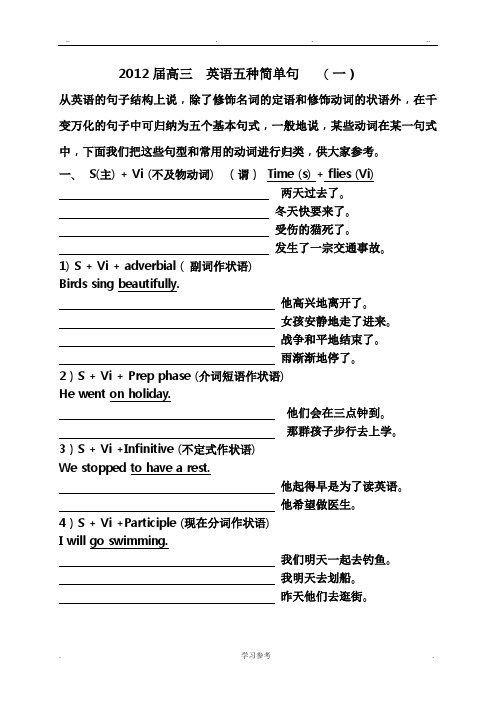
从英语的句子结构上说,除了修饰名词的定语和修饰动词的状语外,在千变万化的句子中可归纳为五个基本句式,一般地说,某些动词在某一句式中,下面我们把这些句型和常用的动词进行归类,供大家参考。
一、S(主) + Vi (不及物动词) (谓)Time (s) + flies (Vi)两天过去了。
冬天快要来了。
受伤的猫死了。
发生了一宗交通事故。
1)S + Vi + adverbial ( 副词作状语)Birds sing beautifully.他高兴地离开了。
女孩安静地走了进来。
战争和平地结束了。
雨渐渐地停了。
2)S + Vi + Prep phase (介词短语作状语)He went on holiday.他们会在三点钟到。
那群孩子步行去上学。
3)S + Vi +Infinitive (不定式作状语)We stopped to have a rest.他起得早是为了读英语。
他希望做医生。
4)S + Vi +Participle (现在分词作状语)I will go swimming.我们明天一起去钓鱼。
我明天去划船。
昨天他们去逛街。
S(主)+ Vt( 及物动词) (谓)+ Object (宾)------- We like English.1)S + Vt + N/ Pron (名词或代词作宾语)I like music. / I like her.他去年教数学。
我们已收到了他们的来信。
2)S + Vt + Infinitive (不定式作宾语)I want to help him.他爸爸期待拥有一家工厂。
他们假装在看书。
我尝试去解决那个问题。
常用于这个句型的动词有:attempt ,dare ,decide, desire, expect, hope, wish, intend, learn, need, offer, pretend, promise, propose, refuse, want, manage, plan, fail, try, agree等。

英语句子的基本句型和成分(含例题及答案解析)句子基本结构和成分1 句子基本句型英语基本句型分为五种:主谓SV、主谓宾SVO、主系表SLP、主谓双宾SVOO、主谓宾宾补SVOC。
五种句型概述:句型主谓SV 主系表SLP 主谓宾SVO 主谓双宾SVOO 主语Everybody She I David 谓语/系动词laughed. is love asked 宾语/表语a teacher. you. me a question. 备注其中‘me’和‘a question’两个宾语。
主谓宾宾补SVOC They painted the wall white. 其中,white 为宾补修饰宾语the wall。
1.1 主谓句型(Subject Predicate Verb-SV)1.1.1 解析主谓句型与主谓宾句型最大的区别在于谓语动词的及物与不及物。
英语把及物动词叫做transitive verb,不及物动词叫做intransitive verb.”transitive”在英语中是传递的意思,所以,如果动词表示的动作可以直接传递到某个事物,则称为及物动词,反之称为不及物动词。
及物动词与不及物动词又可以称为外动作词和内动作词。
外动作词是动作涉及或(达到)别的事物的动词,内动作词是动作凝于或止于主体本身的动词。
11.1.2 基本结构:主语+不及物动词1.1.3 主语可以作主语的成分有名词(如boy),主格代词(如you),数词,动词不定式,动名词等。
主语一般在句首。
注意名词单数形式常和冠词不分家。
1.1.4 谓语谓语由动词构成,是英语时态、语态变化的主角,一般在主语之后,后接宾语。
但谓语可以是不及物动词(vi.),没有宾语,形成主谓结构。
1.1.5 例句分析:(1)The sun is rising. 太阳正在升起。
(2)Tim is sleeping. 蒂姆正在睡觉。
(3)The train is arriving. 火车要到站了。
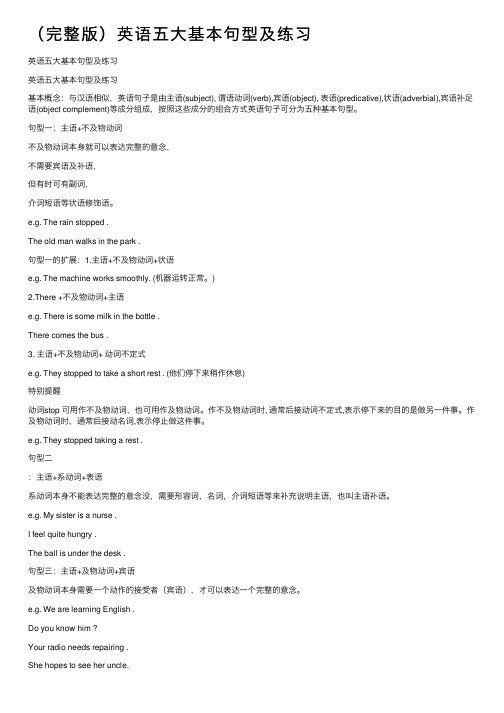
(完整版)英语五⼤基本句型及练习英语五⼤基本句型及练习英语五⼤基本句型及练习基本概念:与汉语相似,英语句⼦是由主语(subject), 谓语动词(verb),宾语(object), 表语(predicative),状语(adverbial),宾语补⾜语(object complement)等成分组成,按照这些成分的组合⽅式英语句⼦可分为五种基本句型。
句型⼀:主语+不及物动词不及物动词本⾝就可以表达完整的意念,不需要宾语及补语,但有时可有副词,介词短语等状语修饰语。
e.g. The rain stopped .The old man walks in the park .句型⼀的扩展:1.主语+不及物动词+状语e.g. The machine works smoothly. (机器运转正常。
)2.There +不及物动词+主语e.g. There is some milk in the bottle .There comes the bus .3. 主语+不及物动词+ 动词不定式e.g. They stopped to take a short rest . (他们停下来稍作休息)特别提醒动词stop 可⽤作不及物动词,也可⽤作及物动词。
作不及物动词时, 通常后接动词不定式,表⽰停下来的⽬的是做另⼀件事。
作及物动词时,通常后接动名词,表⽰停⽌做这件事。
e.g. They stopped taking a rest .句型⼆:主语+系动词+表语系动词本⾝不能表达完整的意念没,需要形容词,名词,介词短语等来补充说明主语,也叫主语补语。
e.g. My sister is a nurse .I feel quite hungry .The ball is under the desk .句型三:主语+及物动词+宾语及物动词本⾝需要⼀个动作的接受者(宾语),才可以表达⼀个完整的意念。
e.g. We are learning English .Do you know him ?句型四:主语+及物动词+间接宾语+直接宾语有些及物动词需要两个宾语才能表达⼀个完整意念。

英语五种句型试题及答案一、选择题1. The sentence "He gave me a book" is an example of which type of sentence?A. Subject-Verb-Object (SVO)B. Subject-Object-Verb (SOV)C. Verb-Subject-Object (VSO)D. Object-Subject-Verb (OSV)2. In the sentence "She is reading a novel," which part is the verb?A. SheB. is readingC. a novelD. a3. Which sentence structure is not one of the five basic English sentence types?A. Subject-Verb-Complement (SVC)B. Subject-Verb-Indirect Object-Direct Object (SVIDO)C. Subject-Verb-Adverbial (SVA)D. Subject-Verb-Object-Object (SVOO)4. The phrase "in the morning" is an example of which type of adverbial?A. Adverb of timeB. Adverb of placeC. Adverb of mannerD. Adverb of degree5. Identify the correct sentence type for "They have been working hard all day."A. SVCB. SVOC. SVAD. SVIDO二、填空题6. The basic sentence structure of "She sings beautifully" is _______.[Answer: SVC]7. In the sentence "The teacher handed the student a book," the direct object is _______.[Answer: a book]8. The sentence "He has finished his homework" is an example of a _______ structure.[Answer: SVO]9. "Quickly" is an adverb modifying the verb "run" in the sentence "He ran quickly to the store." What type of adverb is it?[Answer: Adverb of manner]10. The sentence "We elected him president" follows the structure of _______.[Answer: SVIDO]三、改错题11. The cat chased the mouse quickly. (Change the sentence to an SVO structure)[Answer: The cat quickly chased the mouse.]12. She is a teacher. (Change the sentence to an SVA structure)[Answer: She is a teacher here.]13. They gave the book to me. (Change the sentence to an SVIDO structure)[Answer: They gave me the book.]14. He is working hard. (Change the sentence to an SVC structure)[Answer: He is hardworking.]15. The children played in the park. (Change the sentence to an SVA structure)[Answer: The children played happily in the park.]四、简答题16. What is the basic structure of a sentence in English?[Answer: The basic structure of a sentence in English is Subject-Verb-Object (SVO).]17. Explain the difference between a direct object and an indirect object in a sentence.[Answer: A direct object is the noun or pronoun that receives the action of the verb, while an indirect object is the noun or pronoun that indicates to whom or for whom theaction is done.]18. Provide an example of a sentence with an adverbial of place.[Answer: An example of a sentence with an adverbial of place is "She hid the treasure in the cave."]19. How many basic sentence types are there in English, and what are they?[Answer: There are five basic sentence types in English: Subject-Verb (SV), Subject-Verb-Object (SVO), Subject-Verb-Complement (SVC), Subject-Verb-Indirect Object-Direct Object (SVIDO), and Subject-Verb-Adverbial (SVA).]20. What is the function of an adverbial in a sentence?[Answer: The function of an adverbial in a sentence is to provide additional information about the verb, such as time, place, manner, or degree.]。
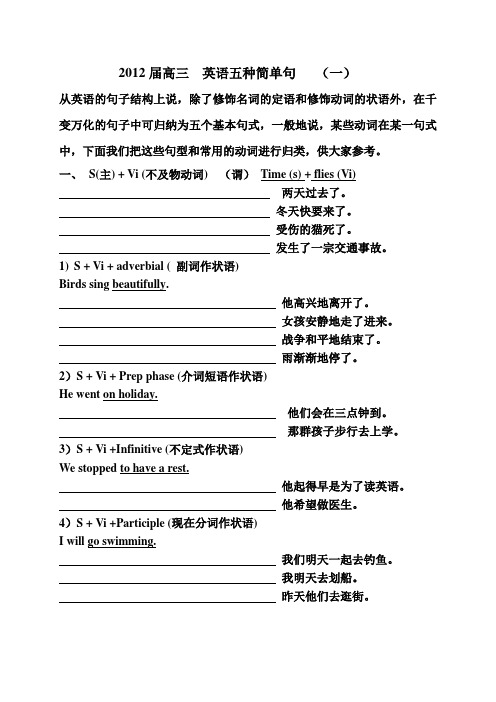
从英语的句子结构上说,除了修饰名词的定语和修饰动词的状语外,在千变万化的句子中可归纳为五个基本句式,一般地说,某些动词在某一句式中,下面我们把这些句型和常用的动词进行归类,供大家参考。
一、S(主) + Vi (不及物动词) (谓)Time (s) + flies (Vi)两天过去了。
冬天快要来了。
受伤的猫死了。
发生了一宗交通事故。
1)S + Vi + adverbial ( 副词作状语)Birds sing beautifully.他高兴地离开了。
女孩安静地走了进来。
战争和平地结束了。
雨渐渐地停了。
2)S + Vi + Prep phase (介词短语作状语)He went on holiday.他们会在三点钟到。
那群孩子步行去上学。
3)S + Vi +Infinitive (不定式作状语)We stopped to have a rest.他起得早是为了读英语。
他希望做医生。
4)S + Vi +Participle (现在分词作状语)I will go swimming.我们明天一起去钓鱼。
我明天去划船。
昨天他们去逛街。
S(主)+ Vt( 及物动词) (谓)+ Object (宾)------- We like English.1)S + Vt + N/ Pron (名词或代词作宾语)I like music. / I like her.他去年教数学。
我们已收到了他们的来信。
2)S + Vt + Infinitive (不定式作宾语)I want to help him.他爸爸期待拥有一家工厂。
他们假装在看书。
我尝试去解决那个问题。
常用于这个句型的动词有:attempt ,dare ,decide, desire, expect, hope, wish, intend, learn, need, offer, pretend, promise, propose, refuse, want, manage, plan, fail, try, agree等。

五种基本句型句子是由主语、谓语动词、表语、宾语、宾语补足语等组成的。
英语句子有长有短,有简有繁,似乎千变万化,难以捉摸,但其实只有五种基本句型。
所有英语句子都可以看成是这五种基本句型的扩大、组合、省略或倒装。
因此掌握这五大句型,是掌握其他各种英语句子结构的基础。
英语句子依其组合方式可分为以下五种基本句型,句子成分的表示法为:S:Subject(主语), V:Verb (动词),O:Object(宾语), IO : Indirect Object (间接宾语), DO: Direct Object (直接宾语) , P:Predicative (表语), OC:Object Complement(宾语补足语)。
五种基本句型见下表(S=主,V=谓,O=宾,P=表,IO=间宾,DO=直宾,OC=宾补):种类句型例句第1种S+V We work. (不及物)第2种S+V+O He plays (及物) the piano.第3种S+V+P We are(系动词) students.第4种S+V+IO+DO She gave(及物) me a pen.第5种S+V+O+OC He made(及物) the boy laugh.一、第1种句型:S+V(主语+不及物动词)1、Birds fly.鸟飞。
主语+谓语(不及物动词)2、He runs in the park.他在公园里跑。
主语+谓语+地点状语(不及物动词)此句型是“主语+不及物动词”构成句子的主体部分。
因为是不及物动词,后面当然不能带宾语了,但是可以有状语来修饰。
例如上面例句中的in the park就是地点状语。
3、Class begins.(begin在句中是不及物动词)上课了。
比较:We begin our class at eight.我们八点钟开始上课。
该句则属于第2种句型,begin在句中是及物动词,由此可见有些动词既可作及物动词也可以作不及物动词。

五种基本句型英语练习题英语句子结构是英语学习中的基础,而五种基本句型是构建英语句子的基石。
以下是五种基本句型英语练习题,帮助学生加深对这些句型的理解并提高应用能力。
1. 陈述句 - 陈述句用来表达一个事实或观点。
请将下列句子转换成陈述句:- 疑问句:Are you a student?- 答案:You are a student.2. 一般疑问句 - 一般疑问句用来询问信息,需要用“是”或“否”来回答。
请将下列陈述句转换成一般疑问句,并给出肯定和否定回答: - 陈述句:She likes reading books.- 一般疑问句:Does she like reading books?- 肯定回答:Yes, she does.- 否定回答:No, she doesn't.3. 特殊疑问句 - 特殊疑问句用来询问特定的信息。
请用下列疑问词(who, what, where, when, why, how)提问,并给出相应的答案:- 陈述句:My brother goes to school by bus every day.- 疑问词:How- 特殊疑问句:How does your brother go to school every day? - 答案:He goes to school by bus.4. 祈使句 - 祈使句用来提出请求或命令。
请根据下列情境写出相应的祈使句:- 情境:提醒某人不要忘记带伞。
- 祈使句:Don't forget to bring your umbrella.5. 感叹句 - 感叹句用来表达强烈的情感。
请将下列陈述句转换成感叹句:- 陈述句:The view from the mountain is beautiful.- 感叹句:What a beautiful view from the mountain!练习题答案:1. You are a student.2. Does she like reading books? Yes, she does. No, she doesn't.3. How does your brother go to school every day? He goes to school by bus.4. Don't forget to bring your umbrella.5. What a beautiful view from the mountain!通过练习这些基本句型,学生可以更好地掌握英语句子的构造,为进一步的英语学习打下坚实的基础。
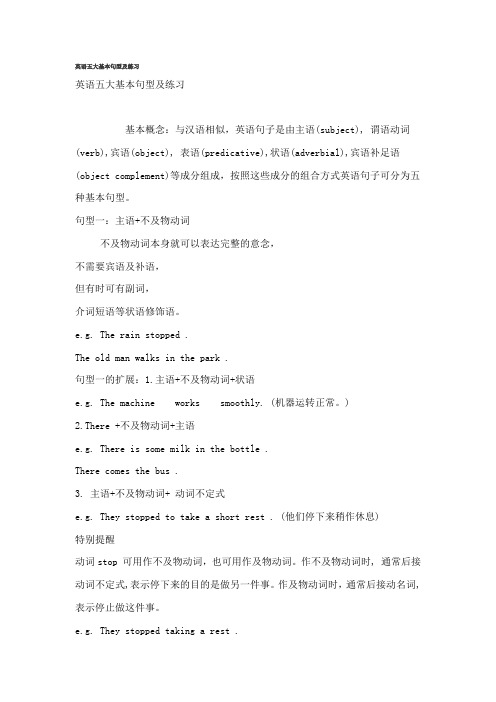
英语五大基本句型及练习英语五大基本句型及练习基本概念:与汉语相似,英语句子是由主语(subject), 谓语动词(verb),宾语(object), 表语(predicative),状语(adverbial),宾语补足语(object complement)等成分组成,按照这些成分的组合方式英语句子可分为五种基本句型。
句型一:主语+不及物动词不及物动词本身就可以表达完整的意念,不需要宾语及补语,但有时可有副词,介词短语等状语修饰语。
e.g. The rain stopped .The old man walks in the park .句型一的扩展:1.主语+不及物动词+状语e.g. The machine works smoothly. (机器运转正常。
)2.There +不及物动词+主语e.g. There is some milk in the bottle .There comes the bus .3. 主语+不及物动词+ 动词不定式e.g. They stopped to take a short rest . (他们停下来稍作休息)特别提醒动词stop 可用作不及物动词,也可用作及物动词。
作不及物动词时, 通常后接动词不定式,表示停下来的目的是做另一件事。
作及物动词时,通常后接动名词,表示停止做这件事。
e.g. They stopped taking a rest .句型二:主语+系动词+表语系动词本身不能表达完整的意念没,需要形容词,名词,介词短语等来补充说明主语,也叫主语补语。
e.g. My sister is a nurse .I feel quite hungry .The ball is under the desk .句型三:主语+及物动词+宾语及物动词本身需要一个动作的接受者(宾语),才可以表达一个完整的意念。
e.g. We are learning English .Do you know him ?Your radio needs repairing .She hopes to see her uncle.句型四:主语+及物动词+间接宾语+直接宾语有些及物动词需要两个宾语才能表达一个完整意念。

基本句型汉译英练习主谓宾结构(一)说明:此结构是由主语+谓语+宾语够成。
其中的谓语动词须是及物的动词或及物的动词词组。
宾语须是名词或相当于名词的成分。
翻译练习:昨晚我写了一封信。
今天下午我想同你谈谈。
这本书他读过多次了。
他们成功地完成了计划。
你们必须在两周内看完这些书。
那位先生能流利地说三种语言。
我收到了笔友从澳大利亚寄来的信。
Jim 还不会自己穿衣服。
我们大家都相信Jack 是一个诚实男孩。
他不知道说什麽好。
他每天早晨洗冷水澡。
我开窗户你在意吗?参考答案:1.I wrote a letter last night.2.I want to talk with you this afternoon.3.He has read this book many times.4.They have carried out the plan successfully.5.You must finish reading these books in two weeks.6.That gentlemen can speak three languages fluently.7.I received a letter from my pen friend in Australia.8.Jim cannot dress himself.9.All of us believe that Jack is an honest boy.10.He did not know what to say.11.He takes a cold bath every morning.12.Do you mind my opening the window?主谓宾结构(二)说明:此结构中的谓语动词常常是动词词组,分两种情况:1.及物动词+副词,2.不及物动词+介词。
1.含有away, out, forward, up 等副词的动词词组是可拆分的。
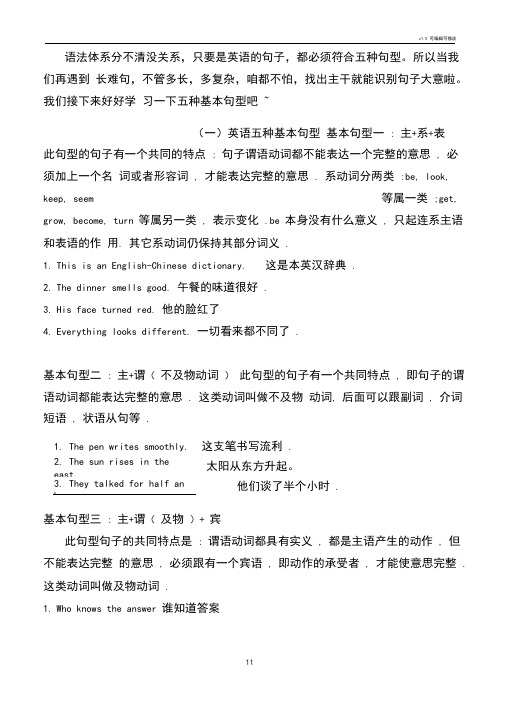
语法体系分不清没关系,只要是英语的句子,都必须符合五种句型。
所以当我们再遇到长难句,不管多长,多复杂,咱都不怕,找出主干就能识别句子大意啦。
我们接下来好好学习一下五种基本句型吧~(一)英语五种基本句型基本句型一: 主+系+表此句型的句子有一个共同的特点: 句子谓语动词都不能表达一个完整的意思, 必须加上一个名词或者形容词, 才能表达完整的意思. 系动词分两类:be, look, keep, seem 等属一类;get, grow, become, turn 等属另一类, 表示变化.be 本身没有什么意义, 只起连系主语和表语的作用. 其它系动词仍保持其部分词义.1.This is an English-Chinese dictionary. 这是本英汉辞典.2.The dinner smells good. 午餐的味道很好.3.His face turned red. 他的脸红了4.Everything looks different. 一切看来都不同了.基本句型二: 主+谓(不及物动词)此句型的句子有一个共同特点, 即句子的谓语动词都能表达完整的意思. 这类动词叫做不及物动词, 后面可以跟副词, 介词短语, 状语从句等.1. The pen writes smoothly. 这支笔书写流利.2. The sun rises in the east. 太阳从东方升起。
3. They talked for half anhour.他们谈了半个小时.基本句型三: 主+谓(及物)+ 宾此句型句子的共同特点是: 谓语动词都具有实义, 都是主语产生的动作, 但不能表达完整的意思, 必须跟有一个宾语, 即动作的承受者, 才能使意思完整. 这类动词叫做及物动词.1.Who knows the answer 谁知道答案2.He enjoys reading. 他喜欢看书.3.My sister is writing a letter at this moment. 我妹妹此刻正在写一封信基本句型四: 主+谓(及物)+ 间接宾语+直接宾语此句型的句子有一个共同特点: 谓语动词必须跟有两个宾语才能表达完整的意思. 最常见接双宾语的动词:give, lend, offer, show, tell, buy, choose, bring, get, leave, make ,gave me a book 他给了我一本书。
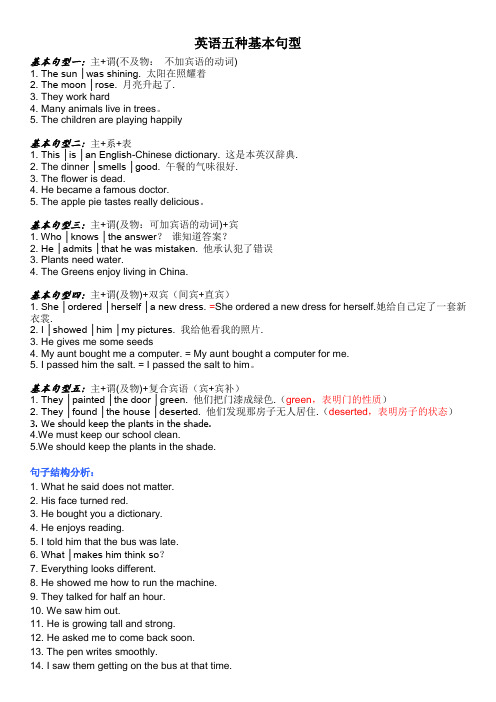
英语五种基本句型基本句型一:主+谓(不及物:不加宾语的动词)1. The sun │was shining. 太阳在照耀着2. The moon │rose. 月亮升起了.3. They work hard4. Many animals live in trees。
5. The children are playing happily基本句型二:主+系+表1. This │is │an English-Chinese dictionary. 这是本英汉辞典.2. The dinne r │smells │good. 午餐的气味很好.3. The flower is dead.4. He became a famous doctor.5. The apple pie tastes really delicious。
基本句型三:主+谓(及物:可加宾语的动词)+宾1. Who │knows │the answer?谁知道答案?2. He │admits │that he was mistaken. 他承认犯了错误3. Plants need water.4. The Greens enjoy living in China.基本句型四:主+谓(及物)+双宾(间宾+直宾)1. She │ordered │herself │a new dress. =She ordered a new dress for herself.她给自己定了一套新衣裳.2. I │showed │him │my pictures. 我给他看我的照片.3. He gives me some seeds4. My aunt bought me a computer. = My aunt bought a computer for me.5. I passed him the salt. = I passed the salt to him。
英语五种基本句型及练习附答案基本句型翻译练习基本句型一: 主+系+表1. 当时他看起来不高兴2. 我喜欢的运动是游泳和滑冰。
3. 我擅长英语。
4. 收到你的来信我很高兴。
5. 在公路对面有一栋新教学楼。
6. 图书馆里有各种各样的书籍、报纸和杂志。
7. 那是在2000年2月8日早上7:15. 8. 天变得越来越黑。
9. 这食物吃起来挺可口的。
10. 这故事听起来很有趣。
基本句型二: 主+谓(不及物动词)1. 1984年至1990年我在光明小学学习。
2. 今天上午,我们在校门口会面然后一起去那里。
3. 时间很快过去了。
4. 这几年我们家乡发生了巨大的变化。
5. 小车没有停而是快速的开走了。
6. 在过去的10年间它的经济进展迅速。
7. 那个年轻人重重地摔倒在地。
8. 过去他早上习惯于早起。
基本句型三: 主+谓(及物)+宾1. 去年在学校电脑竞赛中我获得了一等奖。
2. 在业余时间我喜欢听流行音乐和收集邮票。
3.几天前我和我兄弟骑自行车去看电影。
4. 我们也在校园内和周围种上了许多树。
5. 晚上时,我可以看电视新闻或看报纸。
6. 在回家的路上他把钱给丢了。
7. 昨晚大约九点的时候,我正在做作业。
8. 才艺展示(Tlent Show)将于6月18日在电视XX举行。
9. 下午,我将带你们转转,看一看一些名胜。
10. 盼望能尽早见到你。
基本句型四: 主+谓(及物)+双宾(间宾+直宾)1. 去年王老师教我们英语。
2. 明天我要给他写封信,告诉他这个好消息。
3. 他们给他提供了一份工作,但他拒绝了。
4. 在我14岁生日时,爸爸给我买了一辆新自行车。
5. 昨晚我花了两小时才完成作业。
6. 对不起,能问你一个问题吗?基本句型五: 主+谓(及物)+复合宾语(宾+宾补)1. 当时我看到那些孩子在河边玩。
2. 我们正在使我们的GJ变得越来越美丽。
3. 当我到达教室时,我发现里边没有人。
4. 昨天下午在公交车上我的钱包让人给偷了。
5. 我注意到凯特整个早上都在图书馆里看书。
6. 父亲叫我给他带些报纸来。
基本句型翻译综合练习:1. 那噪音太响,我无法继续学习。
2. 得知你9月份要来我很高兴。
3. 人们需要一个可以休息和玩乐的地方。
4. 当那个人在过马路时,小车撞了他。
5. 我已答应明天下午3:30到机场接他。
6. 听了我说的话,我的邻居向我道歉并马上把电视音量关小。
7. 他是一个很有学问的人我们都很观赏他。
8. 在过去,人们主要通过写信、打公共XX来彼此保持联系。
9. 我XX愿呆在家里,因为我可以做我想做的,比如:读书、看电视、帮助父母做家务。
10. 我们应该把ZG文化和历史介绍给外国人,以便他们能更多的了解ZG。
11. 为了改善交通,政府应鼓舞更多人使用公共交通或自行车。
12. 以我的观点来看,考试作弊是错的,因为它违反了学校规章。
13. 我们学生应该诚实,尽力通过努力学习而不是考试作弊来获得好成绩。
14. 有个老人静静地坐在附近的一个板凳上。
一.文章的起承转合与逻辑关系(一)表示“起”的词/词组:用于开篇引出扩展句。
t first 最初for one thing…(for nother)t present 现在;当今首先…(其次)…recently/ltely最近first(ly)第一in generl 一般说来in the beginning 起初one the one hnd…(on the other hnd)一方面…(另一方面) generlly speking 一般地说to begin with/ first of ll/ in the first plce /to strt with首先;第一on the whole 总的来说(二)有关“承”的常用词语:用来承接上文。
fter tht/fterwrds此后by this time 此时fter few dys 几天以后certinly 无疑地;当然地fter while过了一会儿therefore 因此;结果lso/too 并且;又for exmple 例如t the sme time 同时for instnce 例如for this purpose 为了这个目的besides/wht’s more/in ddition 而且;此外from now on 从此second/secondly第二;第二点in ddition to…除…之外in fct 事实上similrly 同样地in other words 换句话说in prticulr 特别(地) soon 不久in the sme wy 同样地still 仍然by the wy 顺便提一句then 然后indeed 的确third/thirdly 第三;第三点menwhile 与此同时moreover 而且,此外for nother 其次no doubt 无疑地such s 正如obviously 明显地lter 后来of course当然ctully/s mtter of fct/in fct/in relity 事实上prticulrly特别地unlike …不像……;和……不同(三)有关“转”的常用词语:用来表示不同或相反的意见。
fter ll 毕竟fortuntely 幸运地ll the sme 依旧;照样however 然而;无论如何nywy 无论如何in spite of 尽管……;虽然……t the sme time同时;然而luckily 幸运地but 但是though/lthough 尽管no doubt 无疑地on the contrry 相反地even though即使otherwise 否则still 仍然unfortuntely 不幸地unlike 不像……;和……不同yet仍;然而;但是especilly 尤其是(四)有关“合”的常用词语:用于小结上文或结束本段落的内容。
bove ll 最重要的是s result结果in sum 总之,简而言之s hs been noted 如前所述in summry 简要地说s I hve sid 如我所述on the whole 总体来说;整个看来t lst 最后therefore 因此thus 因此briefly 简单扼要地to spek frnkly 坦白地说by doing so 如此to sum up 总而言之eventully 最后surely 无疑finlly 最后to conclude 总而言之in brief 简言之no doubt 毫无疑问in conclusion 总之,最后undoubtedly 无疑in short 简而言之truly 的确in word 总之so 所以certinly 当然地;无疑地obviously 显然ll in ll 总之lst but not the lest最后但也是最重要的(五)句子间的逻辑关系强调still, indeed, pprently, of course, fter ll, interestingly, lso, bove ll, surely, certinly, undoubtedly, in ny cse, nywy, bove ll, in fct, especilly, obviously, clerly.比较like, similrly, in the sme wy, in the sme mnner, eqully.对比by contrst, on the contrry, while, on the other hnd, unlike, insted, but, different from, however, otherwise, wheres然而, unlike, yet, in contrst.列举for exmple, for instnce, such s, tke …for exmple, except (for).时间lter, next, then, finlly, t lst, eventully, menwhile, from now on, t the sme time, for the time being目前,临时, in the end, immeditely, in the menwhile, recently, soon, now nd then, during---, nowdys, since, ltely, s soon s, fterwrds, temporrily, erlier, now, fter while.顺序first, second, third, then, finlly, to begin with, first of ll, in the first plce, lst, next, bove ll, lst but not the lest, first nd most importnt.可能probbly, perhps, mybe解释in other words, in fct, s mtter of fct, tht is, nmely.递进Wht is more, in ddition, nd, besides, lso,furthermore, too, moreover, s well s, dditionlly. 让步lthough, fter ll, in spite of…, despite, even if, even though, though.转折however, rther thn, insted of, but, yet, on the other hnd, unfortuntely, wheres原因for this reson, due to, thnks to, becuse, becuse of, s, since, owing to.结果s result, thus, hence, so, therefore, ccordingly, consequently, s consequence总结on the whole, in conclusion, in word, to sum up, in brief, in summry, to conclude, to summrize, in short.一1. He looked unhppy t tht time.2. My fvourite sports re swimming nd skting.3. I m very good t English.4. I ws so plesed to her from you.5. On the other side of the rod there is new clssroom/teching building.6. In the librry there re ll kinds of books, newsppers nd mgzines.7. It ws 7:15 on the morning of Februry 8, 2000. 8. It is getting drker nd drker.9. The food tstes delicious. 10. The story sounds very interesting.二1. I studied in Gungming Primry School from 1984 to 1990.2. This morning we met t the school gte nd went there together.3. The time pssed quickly.4. Gret chnges hve tken plce in our hometown these yers.5. The cr didn't stop but drove off t gret speed.6. Its economy hs developed rpidly in the pst ten yers.7. The young mn fell down on the ground hrd. 8. He used to get up erly in the morning.三1. Lst yer I won first prize in the school computer competition.2. In my spre time I enjoy listening to populr music nd collecting stmps.3. The other dy my brother nd I went to the cinem by bicycle.4. We lso plnted lot of trees in nd round the school.5. In the evenings I cn wtch news on TV or red newsppers.6. He lost the money on his wy home.7. bout 9 o'clock lst night, I ws doing my homework.8. Tlent Show will be held in Beijing Television Sttion on July 18.9. In the fternoon, I’ll show you round nd tke you to some plces of interest.10. I’m looking forwrd to meeting you soon.四1. Mr Wng tught us English lst yer.2. Tomorrow I’ll write him letter nd tell him the good news.3. They offered him job, but he turned it down.4. On my 14th birthdy, Fther bought me new bike.5. It took me two hours to finish my homework lst night.6. Excuse me, cn I sk you question?五1. I sw the kids/children plying by the river t tht time.2. We re mking our country more nd more beutiful.3. When I got to the clssroom, I found nobody in.4. I hd my wllet stolen on bus yesterdy fternoon.5. I noticed Kte reding in the librry ll the morning.6. Fther sked/got me to bring him some newsppers.Key:1. The noise ws so loud tht I couldn't go on studying.2. I’m so gld to lern tht you’re coming in September.3. People need plce where they cn rest nd enjoy themselves.4. The cr hit the mn while he ws crossing the rod.5. I hve promised to meet him t the irport t 3:30 tomorrow fternoon.6. fter hering wht I sid, my neighbor pologized to me nd turned down the TV immeditely.7. He is such lerned person tht we ll dmire him very much.8. In the pst, people kept in touch with ech other minly by writing letters or using the public telephone.9. I prefer to sty t home, for I cn do wht I like, such s reding books, wtching TV, nd helping my prents with the housework.10. We should introduce the Chinese culture nd history to foreigners so tht they my know Chin better.11. To improve the trffic in Beijing, the government should encourge more people to use public trnsport nd bicycles.12. In my opinion, it is wrong to chet in exmintions becuse it breks the rules of schools.13. We students should be honest nd try to get good results by studying hrd insted of cheting in exmintions.14. There ws n old mn sitting quietly on bench nerby.1。